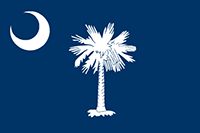South Carolina Gambling

Not much going on in South Carolina. If you’re a resident, looks like you’ll have to cross state lines in order to enjoy casino games.
Online Gambling in South Carolina
The only form of legal online gaming in South Carolina is fantasy sports. FanDuel, DraftKings, Yahoo and many others offer the games. The state’s attorney general noted that these games are likely legal and there have been no complaints from residents calling for an investigation.
Most states with legal greyhound racing permit wagering on horses through mobile devices and websites. That is not the case in South Carolina. Horseracing apps like TVG are not legal in the state. Any site offering racing, poker, casino or sports betting is not licensed to operate in South Carolina.
South Carolina Live and Online Gambling Laws
South Carolina does not have a reputation for legalized gambling. There are no land-based casinos and efforts to change that have always fallen flat. While that is the case, there are still several forms of legal South Carolina gambling and its past involves one of the most unusual cases of its kind in the country.
South Carolina Lottery
South Carolina residents approved a state lottery in 2001. The first lottery tickets were sold in January 2002. The original lottery included only scratch-off tickets. Multi state lotto drawings were added in January 2010. Proceeds go towards public schools in South Carolina.
South Carolina Bingo
South Carolina permits charitable bingo. Due to this exemption, the Catawba Tribe in Rock Hill may also spread these games. Manual and electronic daubing is available at the state’s bingo calls. Cash prizes may be won.
Casino Cruises
There are two casino cruise ships that dock north of Myrtle Beach in the Little River Inlet. The ships have different names – Big M Casino and SunCruz Aquacasino – but both are owned by the same company. Casino games include video poker, slots, blackjack, craps, roulette, Let it Ride, Three Card Poker and craps.
The Catawba Tribe is attempting to build a casino on its reservation along the North Carolina border. The plans have yet to be approved. The Catawba Tribe is lobbying both North and South Carolina.
Greyhound racing Greyhound racing is technically legal in South Carolina. Racetracks ended operation decades ago. Horse racing is not legal, nor is off-track betting. Attempts to change this in recent years have been unsuccessful.
South Carolina Video Poker Scandal
There was a time that there were more casinos in South Carolina than in any other state. As ridiculous as it sounds, it is true. It was caused by a law nobody in the state legislature knew they were passing.
In 1986, the words “or property” were removed from an antigambling law in South Carolina. This was done to permit prizes awarded by arcades. It had a consequence that South Carolina residents would fight over for the next 13 years.
Video poker shacks popped up all over South Carolina after this law went into effect. These housed dozens of machines. Gas stations, bars, bowling alleys and arcades took advantage of this loophole.
There were 7,000 gaming establishments in South Carolina at one point. These businesses hosted a combined 34,000 video poker machines. To put that number in perspective, the Las Vegas Strip is home to about 45,000 machines.
Lawmakers attempted to regulate the multibillion dollar video poker industry in South Carolina. One initiative limited establishments to five machines. The definition was so vague that casino owners decided that an establishment was just a set of walls. The businesses simply broke up a business into cubicles and rooms to comply.
A win limit of $125 was created by the state legislature. Players that won more simply returned every day to collect another $125 until the jackpot was paid in full.
Casinos were not permitted to be open between 12:01 AM on Sunday and 7 AM on Monday. Casinos actually complied with this term. Taxes were never levied on the industry. No licensing or regulations ever covered owners of these machines. Minors were permitted to play by law, although most establishments limited gaming to players 19 years of age and older.
Gambling losses were mounting for residents and the political system was corrupted because of all the video poker money flowing into it. South Carolina lawmakers decided that enough was enough. The state legislature gave voters the right to vote on whether video poker could remain legal in 1999.
It seemed that this move was not really intended to permit a statewide referendum. It read that if voters did not affirm the games, they would become illegal. The South Carolina Constitution does not give voters a referendum right. The South Carolina Supreme Court struck down that portion of the law and video poker was deemed illegal since voters could not act on it.
South Carolina video poker casinos went permanently dark on June 30, 2000. Most of the 34,000 machines found their way into Georgia, North Carolina and West Virginia. Georgia and North Carolina eventually banned the machines. West Virginia took the path of regulating and taxing them through the state lottery.
